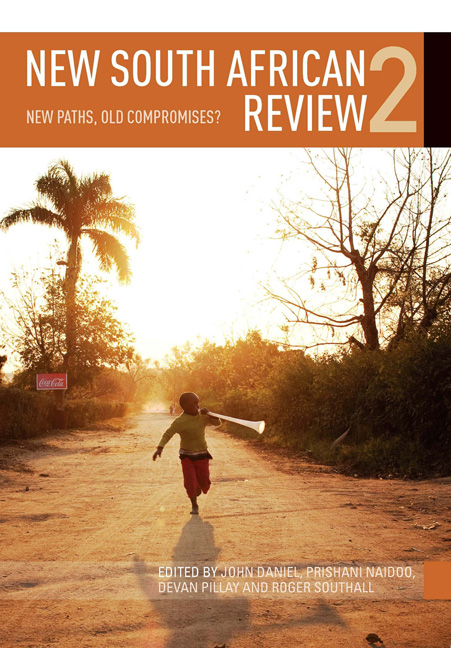Book contents
- Frontmatter
- Contents
- Preface
- Introduction: New paths, old (com)promises?
- PART 1 POLITICS AND INTERNATIONAL
- Introduction: The Zuma presidency: The politics of paralysis?
- Chapter 1 The Tripartite Alliance and its discontents: Contesting the ‘National Democratic Revolution’ in the Zuma era
- Chapter 2 The African National Congress and the Zanufication debate
- Chapter 3 Dancing like a monkey: The Democratic Alliance and opposition politics in South Africa
- Chapter 4 Democracy and accountability: Quo Vadis South Africa?
- Chapter 5 Civil society and participatory policy making in South Africa: Gaps and opportunities
- Chapter 6 Bring back Kaiser Matanzima? Communal land, traditional leaders and the politics of nostalgia
- Chapter 7 South Africa and ‘Southern Africa’: What relationship in 2011?
- PART 2 ECONOMY AND SOCIETY
- PART 3 ENVIRONMENT
- PART 4 MEDIA
- Contributors
- Index
Chapter 4 - Democracy and accountability: Quo Vadis South Africa?
from PART 1 - POLITICS AND INTERNATIONAL
Published online by Cambridge University Press: 23 March 2018
- Frontmatter
- Contents
- Preface
- Introduction: New paths, old (com)promises?
- PART 1 POLITICS AND INTERNATIONAL
- Introduction: The Zuma presidency: The politics of paralysis?
- Chapter 1 The Tripartite Alliance and its discontents: Contesting the ‘National Democratic Revolution’ in the Zuma era
- Chapter 2 The African National Congress and the Zanufication debate
- Chapter 3 Dancing like a monkey: The Democratic Alliance and opposition politics in South Africa
- Chapter 4 Democracy and accountability: Quo Vadis South Africa?
- Chapter 5 Civil society and participatory policy making in South Africa: Gaps and opportunities
- Chapter 6 Bring back Kaiser Matanzima? Communal land, traditional leaders and the politics of nostalgia
- Chapter 7 South Africa and ‘Southern Africa’: What relationship in 2011?
- PART 2 ECONOMY AND SOCIETY
- PART 3 ENVIRONMENT
- PART 4 MEDIA
- Contributors
- Index
Summary
‘What makes modern constitutions work?’ The one-word answer to that question, if there is one, is ‘accountability’. A society which has the necessary political will to exact accountability from those in charge is one in which constitutionalism has the chance to flourish. Accountability may thus be defined as the obligation of those with power or authority to explain their performance or justify their decisions. This chapter examines aspects of the notion of democratic constitutionalism that have been incorporated as founding provisions of the new dispensation in South Africa.
Democracy in its classical Greek form meant exactly the same as that claimed in the liberation struggles of Africa so many thousands of years later: ‘Power to the people’ or, in local parlance, ‘Amandla awethu!’
The problem with the liberation movements of Africa, including South Africa, is that what starts out as the people's struggle for freedom transmogrifies along the way into the politicians’ or ruling elites’ struggles for power. This is where constitutional theory and practical politics part company. The yearnings for freedom from the yoke of colonialism, racism and ethnic dominance become subjugated to the power plays of factions within the ruling elite, and the ordinary people often find themselves worse off (as in Zimbabwe now) or not much better off (as seen elsewhere in postcolonial Africa) than they were before receiving the blessing of liberation. Nevertheless, ordinary voters feel a national debt of gratitude towards liberation movements, and these movements continue to draw electoral support (both real and contrived) in the most perplexing of circumstances and often well after their sell-by date. Robert Mugabe only – and only just – lost a general election in March 2008, twenty-eight years after ‘liberating’ his country. He is not exceptional. Many of the so-called ‘big men’ of Africa continue to rule their grateful but oppressed followers long after the stated purpose of the liberation struggle has been achieved. The promotion of human dignity, the achievement of equality and the advancement of the various freedoms for which ordinary Africans have struggled are the main casualties of this unfortunate process. In South Africa, the lack of governmental responsiveness to the needs of ordinary people has sparked widespread service delivery protests (or activities dressed up as service delivery protests which are in fact the upshot of faction fighting within the governing Tripartite Alliance).
- Type
- Chapter
- Information
- New South African Review 2New paths, old compromises?, pp. 83 - 99Publisher: Wits University PressPrint publication year: 2012



